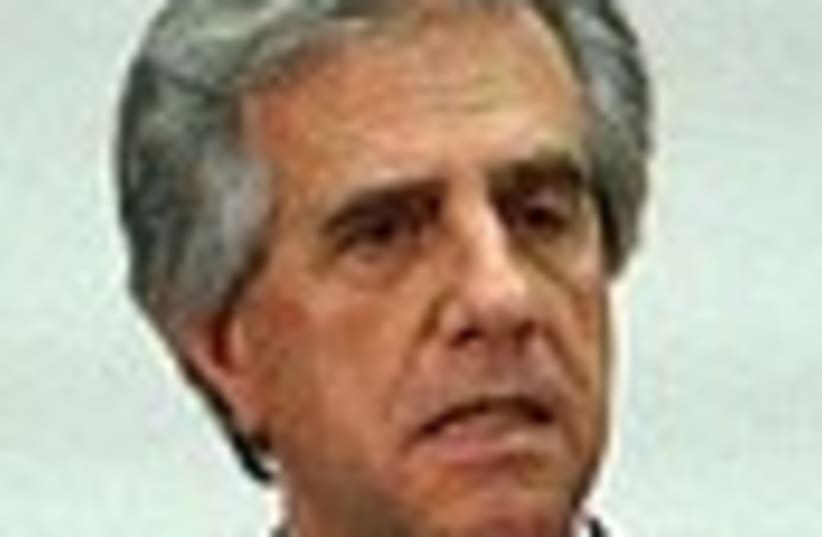Bienvenido, Presidente Vazquez
Uruguay is S. America's most solid democracy and one that bears a long and rich relationship with Israel.
Some true friendships, between countries as much as between individuals, are no less charming because they are minor.
This year, Uruguay's President Tabaré Vázquez will be celebrating his country's independence day, August 25, in Israel. Vázquez, an oncologist, has been here before. He studied for half a year at the Weizmann Institute in Rehovot, and visited in 1992 as mayor of Montevideo. But yesterday he arrived for his first state visit, a five-day trip during which he will meet Prime Minister Olmert, President Peres, and Foreign Minister Livni.
Elected to a five-year term in 2004, Vázquez is Uruguay's first left-wing president. His Frente Amplio (Broad Front) government is based on a coalition that includes Communists, social democrats and former Tupamaro guerrillas. His country, wedged between Brazil and Argentina, is not large. Slightly smaller than Oklahoma, its population is half that of New York City.
But it is also South America's most solid democracy - and one that happens to bear a long and rich relationship with Israel. At the 1920 San Remo conference, Uruguay strongly supported the Balfour Declaration. Before World War II, thousands of European Jews - from Germany and Hungary in particular - found refuge in Uruguay; in 1939 alone, some 2,200 Jews entered the country.
Uruguayans like to tell a self-deprecating joke: If you get diagnosed with a terminal illness, move to Uruguay - everything there happens 20 years late. While this might be true in connection with the country's transition from an interlude of autocracy before its return to full-fledged democracy, it is the very opposite of the truth with regard to its stance on the Jewish state.
In 1947, Uruguay's pro-Zionist UN delegate, Rodriguez Fabregat, was instrumental in getting the partition plan passed. Three days before it did, he posed a question to the General Assembly at Flushing Meadow, New York: "Why is it necessary that there should be a Jewish State? Precisely to put an end to that form of discrimination and alienation, [and] persecution of a section of humanity." The decision to create that state, he said, "will go down to history as the first great moral victory of the United Nations." The next year, Uruguay became the first Latin American country to recognize the State of Israel, and it later became one of the few countries to recognize Jerusalem as the capital. Uruguay's capital, for its part, boasts a Golda Meir Square.
Since then, however, more than half of Uruguay's 40,000 Jews have emigrated - 10-12,000 of them to Israel, the largest proportion of any Western Jewish community. Some fled the right-wing military dictatorship that ruled from 1972 to 1985, and that killed, jailed, tortured and exiled many thousands of Uruguayans. (Earlier this year, a federal appeals court confirmed charges of multiple murders against former president Juan MarÃa Bordaberry in connection with the "disappearances" of the 1970s.)
More recently, others were induced to leave by Uruguay's deep recession of 2002 and 2003, which was caused by foot-and-mouth disease (devastating beef exports), the economic crisis of neighboring Argentina, bank collapses and massive currency devaluation. According to a Joint Distribution Committee study, 22 percent of the country's adult Jewish population are "poor" and over 40 percent are "vulnerable."
THESE DAYS, relations between our two countries are broadening. A large part of that friendship expresses itself in economic terms. Israel imports some $70 million a year from Uruguay. In December, Minister of Industry and Trade Eli Yishai traveled to Montevideo to sign a free trade agreement with Mercosur, the trade bloc that comprises Argentina, Brazil, Paraguay and Uruguay.
According to the agreement - Israel's first in South America - customs duties on exports from Israel to those countries will be cut by 40 per cent over the next four years, and in some sectors will be cut entirely within a decade. The trade accord, ratified three days ago by Uruguay's parliament, "shows how important the Israeli market has become," said Itzhak Levanon, Israel's representative at the World Trade Organization.
After his election, Vázquez reiterated that his country's friendship with Israel stands regardless of which party holds power. Welcome to Israel, Mr. President, and Happy Independence Day!

